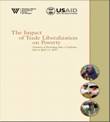This section of PovertyFrontiers features
publications related to poverty
reduction.
Publications are centrally
located in our All Publications
Alphabetically () section, and can also
be searched using our advanced search
page (
). Publications are also categorized into the
following sections:
USAID Conference Proceedings and CD
Explore
Poverty Reduction in Conflict and
Fragile States at the Household Level
Conference proceedings are now available for the
Poverty Reduction in Conflict and Fragile States:
Perspectives from the Household
Level conference, held November 8-9, 2006 in
Washington D.C. The publication is accompanied by a
CD-ROM of conference resources including participant
papers and presentations, audio recordings of sessions,
and session notes. The international conference was
organized by USAID’s
Office of
Poverty Reduction (PR), the
Households in Conflict Network
(HiCN), and the
German
Institute for Economic Research (DIW Berlin) to
focus on the special challenge of poverty reduction in
conflict and fragile states. While the general effects
of conflict and state fragility on poverty have been
explored extensively, more understanding of what happens
at the micro level is needed to help guide policy and
programs. Focusing at the household level provided
an opportunity to understand how conflict and fragility
affect household behavior, welfare and poverty. The
conference facilitated broader interest in developing
innovative research and programmatic and policy
responses to poverty reduction in these unique
environments. For more on the conference, visit
www.povertyfrontiers.com/conference.
 PASSN Pro-Poor CD Documents
Available Online
PASSN Pro-Poor CD Documents
Available Online
USAID's Poverty Analysis and Social Safety
Net (PASSN) Team has made available online the
contents of its CD titled "Pro-Poor Growth: A Guide to
Policies and Programs." The CD is a compilation of
the work of prominent researchers who examine the
complex relationship between economic growth and poverty
reduction, and features their findings, recommendations,
and conclusions. The CD is both a general
reference and a functional tool to support poverty
reduction efforts. It contains a guide to assist
designers of pro-poor growth strategies in developing
countries. It also contains case studies highlighting
how and why selected coun-tries succeeded or failed in
improving the plight of the poor.
To
access the contents of the CD, click
here.
The Impact of Trade Liberalization on
Poverty: Conference Proceedings Available
This publication summarizes the
proceedings of a conference, “The Impact of Trade
Liberalization on Poverty,” hosted by the Woodrow
Wilson International Center for Scholars with
support from the USAID Poverty Assessment and Social
Safety Nets team and the 3M Company on April 15,
2005. The daylong conference brought together
national and international stakeholders, including
economists, policy analysts, policymakers, and
business leaders from different parts of the
developing world to examine how trade liberalization
affects poverty. Sessions were dedicated to
understanding the linkages among trade, growth, and
poverty; how the poor respond to trade-related
opportunities and challenges; the types of
institutions and complementary policies needed to
ensure that trade liberalization benefits the poor;
and the challenges faced by policymakers in the
context of the Doha round of WTO negotiations.
To access the conference
proceedings, please click
here
.
New USAID Toolkit

Livelihoods and Conflict: A
Toolkit for Programming
The Office of Conflict Management and
Mitigation in DCHA is launching its new Livelihoods
& Conflict Toolkit, the fourth in the toolkit
series developed by CMM to explore how development
assistance can address key risk factors associated
with conflict, instability, and extremism. The new
toolkit was developed with extensive participation
from the Poverty Analysis and Social Safety Net
team.
The toolkit provides USAID mission
staff and their partners with: 1) an examination of
the relationship between conflict and people’s
livelihoods; 2) lessons in developing livelihoods
programs--including an introduction to livelihood
analysis; 3) a range of program options designed to
reduce livelihood vulnerability, strengthen
resiliency, and help people manage conflict-related
shocks; and 4) listings of relevant USAID
mechanisms, implementing partners, and contact
information.
For a hardcopy, please email
Juliet Hunt at jhunt@usaid.gov.
In December of 2005, Laura Hammond
presented
Crisis and Recovery Skills
Training: Livelihoods and Conflict
. This presentation serves as an overview for the
Livelihoods and Conflict
Toolkit
. To access this presentation and meeting
notes, click
here
.
Other New Publications on
PovertyFrontiers
DFID and the Private Sector: Working with the
Private Sector to Eliminate
Poverty: This recent
publication demonstrates the variety of DFID's work in areas
such as infrastructure, investment climate reform,
international trade, and increasing the access of the poor
to business, financial, and social services.
Growth, Poverty and Inequality: Eastern Europe and
the former Soviet Union: This World
Bank publications reports that Eastern Europe and the former
Soviet Union have witnessed a significant decrease in
poverty, but poverty and vulnerability persist in the
region, with more than 60 million people living on less
than $2 a day.
Word Development Report
2006: The World Bank's annual
publication focuses on eqity and development. The
report concludes that "inequality of opportunity, both
within and among nations, sustains extreme deprivation,
results in wasted human potential and often weakens
prospects for overall prosperity and economic growth."
U.N.D.P. Human Development Report
2005: Entitled International
Cooperation at a Crossroads: Aid, trade, and security in an
unequal world, this report takes stock of human development,
including progress towards the Millenium Development Goals
(MDGs).
World Resources Report (WRR): Wealth of the Poor: Managing
Ecosystems to Fight Poverty is the
first of three issues that will deal with the relationship
between natural resources, economic growth, and democratic
governance. The report challenges conventional
approaches and stresses the urgent need to look beyond aid
projects, debt relief and trade reform and focus on local
natural resources to address the crisis of poverty in all
parts of the globe. The USAID/EGAT Office of Natural
Resources Management-led initiative “Nature, Wealth and
Power: Best Practice for Revitalizing Rural Africa”
is recognized as the intellectual foundation of the new
WRR.

